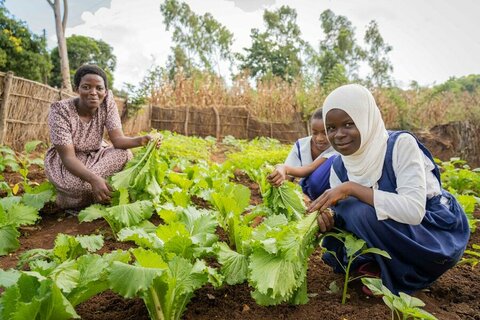Consider the huge cost of NOT funding school meals, urges WFP chief
The price of failing to fund children’s school meals far outweighs the cost of such programmes, World Food Programme (WFP) Executive Director David Beasley said yesterday (28 July).
“We all understand the power of children getting an education, and we also understand the power of children getting a good school meal,” said Beasley, addressing the UN Food Systems Pre-Summit in Rome.
“The question to me is: ‘What’s the cost of NOT providing a school meal to all the children on the planet?’ If you want increased poverty, don’t provide school meals. If you want more child marriages, don’t provide school meals. If you want more destabilization and migration, and recruitment by extremist groups, don’t provide school meals.
“But if you want to see stronger local communities, and teen-pregnancy rates drop, and educational opportunities increase, and GDP and economic empowerment, especially of girls – if you want to see that increase, then provide school meals.”
Beasley also quoted a World Bank report of 2018, which indicated that limited educational opportunities for girls, and barriers to completing 12 years of education, were costing countries up to US$30 trillion in lost lifetime productivity and earnings.

The Executive Director was speaking at the session School Meals Coalition: Nutrition, Health and Education for Every Child. The coalition is a government-led initiative, supported by WFP, to drive urgent action that improves and strengthens school meal systems globally.
Beasley highlighted analysis WFP had conducted with Harvard University, which found that each US$1 invested in school feeding yielded US$9 in economic returns.
“We have 73 million vulnerable children in the world today that don’t get a school meal, regardless of COVID,” said the Executive Director. The price tag to reach these children and make up ground lost to COVID-19 is US$4.7 billion, but “the price tag of not providing school meals is multiple times that”.
School Meals Coalition: Uniting to transform the lives of children

WFP is the principal humanitarian organization supplying meals, feeding up to 17 million children. A further 40 million children are fed by government programmes supported by WFP.
COVID-19 had a devastating impact on this support, with a total 1.6 billion children out of school at the height of the pandemic. The agency moved fast, in coordination with its partners, to provide home-grown school meals, vouchers and take-home rations.
Now the School Meals Coalition will bring together governments, UN agencies, civil society, the private sector, academia and others to re-establish, improve and scale-up school meals programmes around the world. The ultimate aim is to ensure that every child has the opportunity of a healthy, nutritious meal in school by 2030.
“We know that our children are the future of a safer, healthier and more peaceful planet,” added Beasley.



